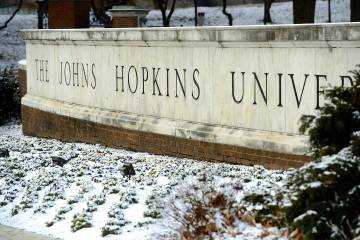Johns Hopkins University will begin implementing its Future of Work model on Feb. 1 as previously announced in November, a model that embraces and codifies the flexibility that many employees have enjoyed during the COVID-19 pandemic while also acknowledging that in-person interaction is essential to the core mission and vitality of the institution.
The university's approach includes four work modalities:
- In-person: On-site 5 days/week
- Hybrid: On-site 3-4 days/week
- Modified Hybrid: On-site 1-2 days/week
- Remote: Not regularly on-site
The vast majority of employees will fall into either the in-person or hybrid modalities, with many experiencing little or no changes to their current work arrangements. Employees should expect more specific information from their managers about how and when changes may be implemented.
The formal policy and guidelines are available on the university's human resources website.
The goal of the plan is to create a workplace that brings more people back on-site more of the time—while improving the work environment in ways that are important to employees and reflect the university's ongoing commitment to continued workplace flexibility.
"Building workplace connections across all modalities and ensuring that flexible work arrangements support professional growth and opportunities for advancement are critical to the success of our go-forward model," Laurent Heller, senior vice president for finance and administration; Pierre Joanis, vice president for human resources; and Sunil Kumar, provost and senior vice president for academic affairs, wrote in a message to Hopkins employees today.
The university's approach is informed by experiences and conversations throughout the pandemic and input shared by employees in approximately 150 meetings and town halls and via 9,000 survey responses. That feedback helped give shape to an approach designed to nurture the essential in-person character of the university's education, research, and service missions while also adapting popular flexible workplace practices.
Support and resources are available for employees who are transitioning to more frequent on-site work, including an expansion of child/dependent care benefits, daily transportation vouchers, and an enhanced JHU shuttle service. Expanded on-campus dining and wellness options are also planned, as is the creation of an annual team-building fund, to be used by divisions and departments to create on-campus events and activities that foster engagement and collaboration.
Employees are encouraged to take advantage of the information and resources available on the university's Future of Work web page, which includes answers to frequently asked questions and an online toolkit "Future of Work Learning Resources", which provides guidance for managers and staff about building and sustaining successful teams.
"Thank you for your continued dedication and commitment to our collective mission," Heller, Joanis, and Kumar wrote. "Your individual contributions make JHU a truly special place."
Posted in University News, News+Info
Tagged human resources, future of work









